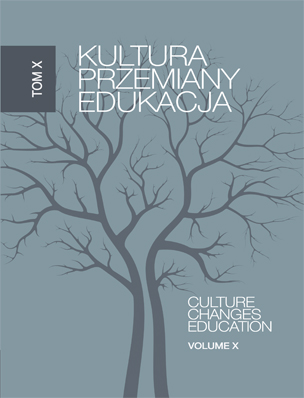Tradition of student activity clubs at secondary schools in the autonomous Galicia in the Krakow and Lviv School Districts of the Second Polish Republic
DOI:
https://doi.org/10.15584/kpe.2022.10.1Keywords:
tradition, grammar schools, student circles, Galicia, Cracow School District, Lviv School District, II Polish RepublicAbstract
In addition to their important didactic role, student academic and interest circles in middle schools in autonomous Galicia played an important educational role. They taught respect for national tradition and history, thus shaping patriotic attitudes. They functioned in practically all junior high schools. The number of them in particular schools varied. They enjoyed the interest of students, as evidenced by their significant attendance at classes. After regaining independence the schools of Cracow School District the Lviv continued the forms of work allowing to enrich the scope of students’ scientific knowledge and to extend the curricula of compulsory subjects with new content. After regaining independence the schools of the Cracow School District continued their forms of work allowing to enrich the scope of students’ scientific knowledge and to extend the curricula of compulsory subjects with new contents, which referred to the Galician tradition. Regardless of the model of education – national or state, they shaped in students the patriotic and civic attitudes. They built respect for national values and rich cultural heritage. Both academic and interest circles functioned in autonomous Galicia, and later in the Second Polish Republic, in practically all middle schools. These circles were thematically related to the curriculum subjects: history, theology, natural sciences, mathematics, physics, German studies, Polish studies, philosophy, as well as those arising from specific student interests, for example: abstinence, theater lovers, self-education, aesthetics, tourism, economics, photography, sightseeing, music and singing, sports, bookbinding, literary, ethics, hygiene, physical activities, art, drama, literature and others. As a rule, the tutors were subject teachers or teachers who were interested in the subject of the club. The Galician student clubs had the support of the school principals. According to them, the clubs should maintain their scientific character, their creation should be supported by teachers, and the decision to organize them should be left to youth councils. Student circles in autonomous Galician middle schools as a form of didactic and educational work were an important contribution to the development of this type of student activity. They were an important contribution to the development of this type of student activity in Polish secondary schools in the interwar years, and thus a contribution of Galician education to the Polish school system of 1918–1939.
Downloads
References
Bostel F., Czytelnie i kółka naukowe młodzieży – ich urządzenie i zadania [w:] Sprawozdanie z trzeciej konferencji dyrektorów szkół średnich galicyjskich odbytej we Lwowie w dniach 23 i 24 marca 1908 roku, Lwów 1909.
Gajak-Toczek M., Dzieje V Gimnazjum Państwowego we Lwowie — wydarzenia, fakty, sylwetki uczniów i nauczycieli, „Folia Litteraria Polonica 14”, 2011.
Słotwiński J., Czytelnie i kółka naukowe młodzieży – ich urządzenie i zadania [w:] Sprawozdanie z trzeciej konferencji dyrektorów szkół średnich galicyjskich odbytej we Lwowie w dniach 23 i 24 marca 1908 roku, Lwów 1909.
Wałek B., Czytelnie uczniowskie i kółka naukowe w procesie kształcenia i wychowania uczniów w galicyjskich szkołach średnich (w świetle sprawozdań szkolnych z lat 1904–1917), „Nowa Biblioteka. Usługi, Technologie Informacyjne i Media” 2016, nr 4, (23).
Downloads
Published
How to Cite
Issue
Section
License
Copyright (c) 2022 KULTURA – PRZEMIANY – EDUKACJA

This work is licensed under a Creative Commons Attribution-NoDerivatives 4.0 International License.


